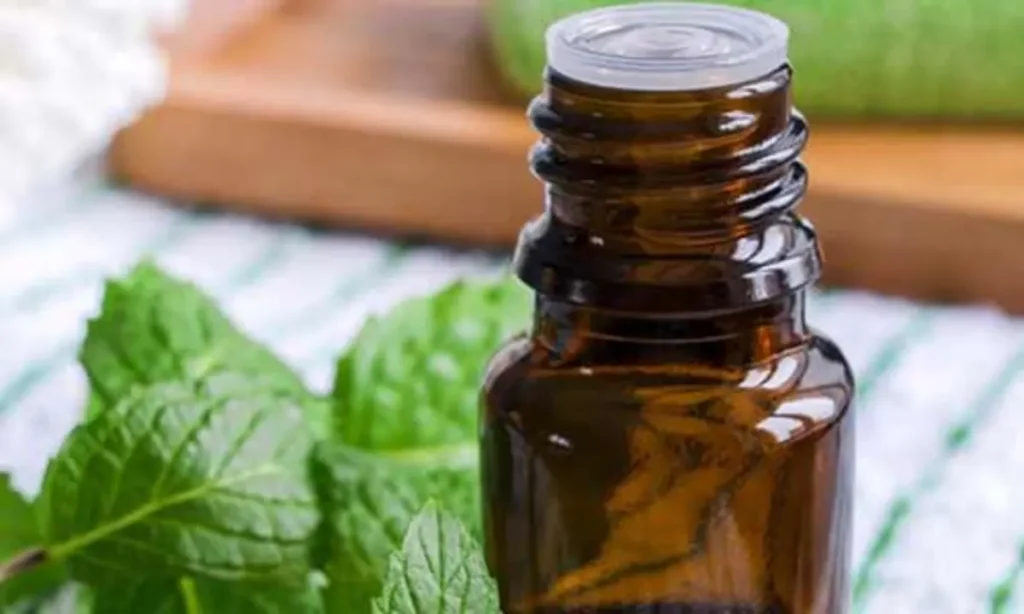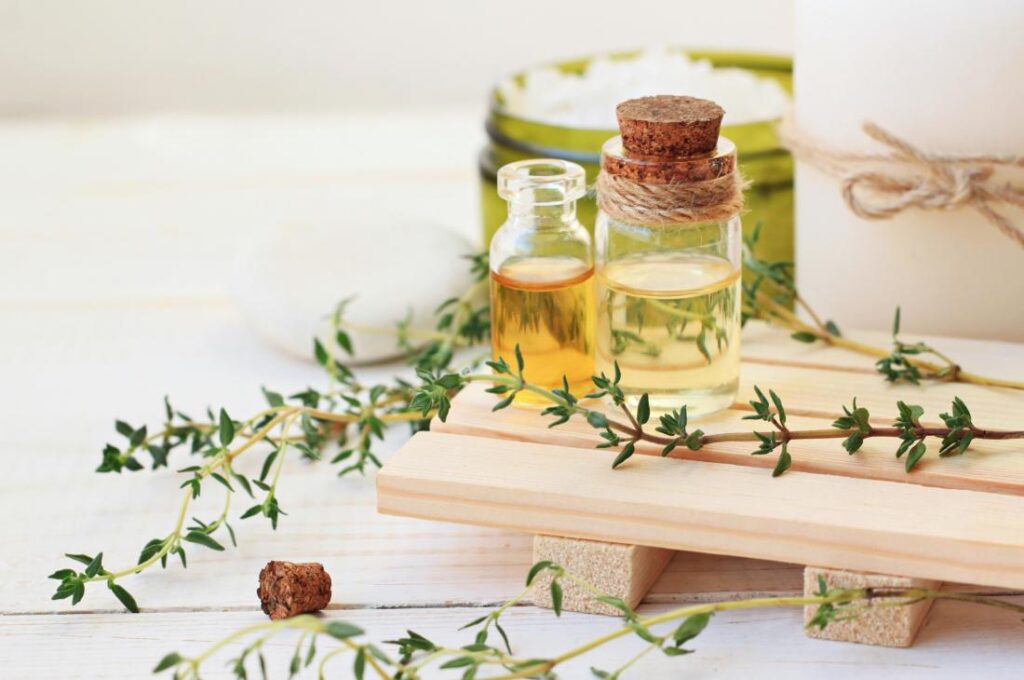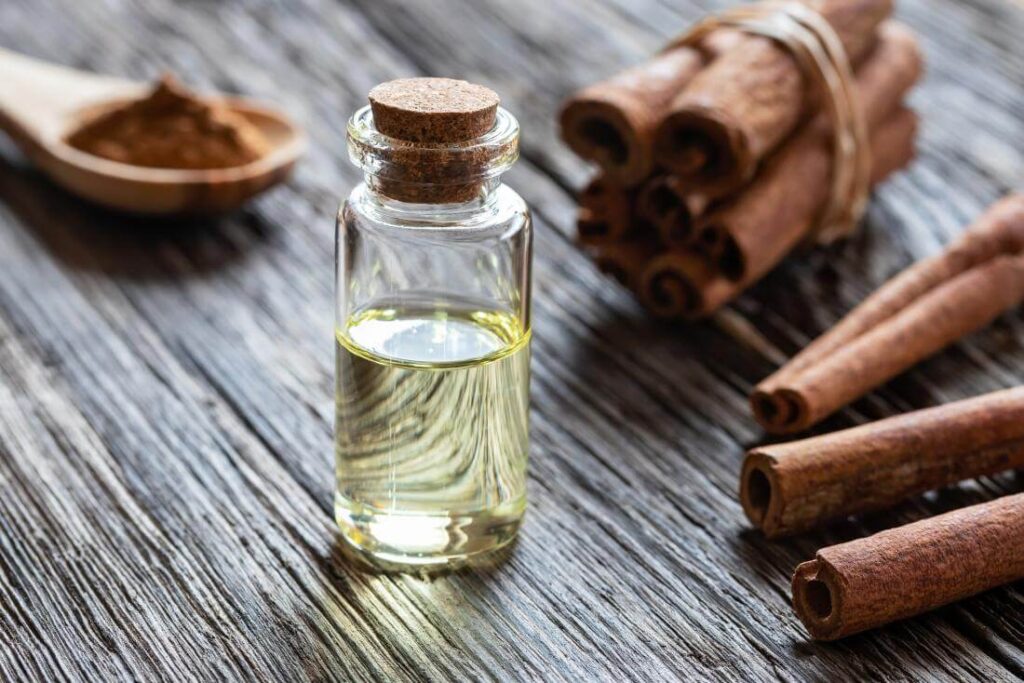A sore throat is a common problem that causes pain and discomfort.
A sore throat may not always seem to be alarming. But it shouldn’t be taken lightly as it’s a sign of a common cold or some other viral infection.
Since bacteria and some viruses are the reason for sore throats, it is really important that you get immediate relief from this illness.
Medical experts suggest that some essential oils may be effective in relieving a sore throat at home.
By reading the following article, you will know the causes of a sore throat, plus some practical remedies for nasal drainage, sore throat, and cough using essential oils.
Essential Oils for Sore Throat: What Research Says?
Essential oil, also known as volatile oils, are obtained from plant materials such as seeds, leaves, twigs, bark, herbs, wood, flowers, buds, fruits, and roots [1].
Almost 200 essentials oils are used commercially for medicinal purposes, among which some are widely used for treating oral pathogens [1].
The antimicrobial property of such essential oils is due to some small terpenoids and phenol compounds [1].
Most of the essential oils used are safe and effective and many people all over the world traditionally use 100% natural.
Some of the essential oils widely used for a sore throat are listed below:
1. Peppermint Oil
Peppermint along with many other herbal medicines is a favorite item across ages. In fact, it is one of the oldest medicinal plants on earth. Ancient civilizations like the Greeks, Romans, and Egyptians used peppermint to cure many illnesses [2].
Over the years, scientists have explored its oil extract and found it to be useful in treating common ailments including cold and its symptoms [2].
In India, it remains a popular home remedy for sore throat and throat irritation [3].
A 2011 study confirms that it has a broad spectrum of antibacterial effects which includes activity against pathogens that cause strep throat infection [3].
Findings from this study suggest that peppermint’s antimicrobial agents make it a viable treatment for a sore throat and other similar conditions such as mouth and throat irritation and typhoid disease [3].
Peppermint oil can be topically applied to the throat area or inhaled as steam.
When you apply it to the skin, it will leave a cooling sensation that can soothe an irritated throat.
Just make sure that you dilute it first in a carrier oil as it can cause skin irritation when used in pure form.
How to use peppermint oil for sore throat:
- Mix five drops of peppermint oil in hot water.
- Inhale the steam.
- Do this remedy twice a day for one week.
- Combine three drops of peppermint oil and almond oil.
- Apply a few drops of the oil mixture to the throat area.
- Leave it on for a few minutes.
- Wipe it off with a clean towel.
- Repeat this technique several times a day for one week.
RELATED: 12 Uses and Health Benefits of Peppermint Oil
2. Eucalyptus Oil
A sore throat can also be caused by tonsilitis, a condition characterized by swelling and infection of the tonsils [4].
With its proven analgesic and anti-inflammatory properties, eucalyptus can ease the pain and tone down swelling caused by tonsillitis [5].
It doesn’t stop there; it also works to kill the source of the problem.
Multiple studies hypothesized the strong inhibitory effects of eucalyptus.
It is because of this; that the eucalyptus can inhibit viruses and bacteria that infect the respiratory tract, including the throat [6, 7].
Of the 120 viral and bacterial isolates that were included in the study, eucalyptus was particularly powerful against parainfluenza, H. influenzae, S. maltophilia, and S. pneumonia [6].
In fact, it even works on drug-resistant bacteria; a 2010 study explains [8].
Iranian researchers recommend further investigation of this matter to evaluate the potential of eucalyptus as a treatment for many respiratory ailments [7].
How to use eucalyptus essential oil for sore throat:
- Pour six drops of eucalyptus oil into a bowl of hot water.
- Take in the steam.
- Repeat two to three times a day for one week.
RELATED: 11 Safe and Natural Home Remedies for Tonsilitis & How to Use Them
3. Clove Oil
Clove can be found in many parts of the world including Indonesia, Zanzibar, Pemba, and the Spice Islands [9].
It is primarily used for adding flavor to dishes but eventually, it has also become well-known as an antimicrobial [9].
So it’s no surprise that it’s now commonly used as a remedy for various bacteria-related illnesses like a sore throat.
Research published in the Journal of Scientific Research documented clove oil’s ability to suppress the growth of Streptococcus pyogenes, among other strains of bacteria [9].
By inhibiting the activities of this bacterial strain, it can prevent the irritation from worsening and turning into a more serious infection.
Because it’s also a remedy commonly used for painful conditions, clove can also provide relief for the pain and discomfort caused by the swelling of the throat.
How to use clove oil for sore throat relief:
- Dilute five drops of clove oil with a teaspoon of olive oil.
- Gargle mixture for one to two minutes.
- Spit it out.
- Rinse mouth with water.
- Do this remedy twice a day for one week.
4. Lemon Oil
Vitamin C has long been established as an efficient way to prevent and treat the common cold and its symptoms [10].
This powerful nutrient does not only appear to control viral respiratory infections, but it can also help boost the immune system and make the defense against harmful pathogens stronger.
It’s no wonder lemon juice, which is packed with vitamin C, is often used for this illness.
When it comes to essential oils, oil extracted from this citrus fruit can also be a boon for those suffering from a sore throat due to colds or other causes.
Lemon oil has been proven to have analgesic and anti-inflammatory properties that can be beneficial for people with throat pain and irritation [11, 12].
Unlike other essential oils that cannot be taken orally, lemon oil is safe to consume.
However, take note that you cannot drink it in undiluted form as it is too strong.
It’s very important to dilute it first in water, tea, or fruit juice before drinking.
Method of using lemon oil to get rid of sore throat:
- Stir five drops of lemon oil in a glass of water.
- Drink concoction once a day for three days.
RELATED: 10 Ways Lemon Oil Can Benefit your Health
5. Oregano Oil
Oregano oil has been well established in scientific research as an antioxidant and antimicrobial [13].
Even in low concentrations, oregano can sufficiently inhibit the growth of various bacterial strains, including those that can cause throat infection [14].
Susceptible to its bactericidal actions are bacterial strains such as Klebsiella pneumonia, Streptococcus pyogenes, and Staphylococcus aureus, among others [14].
It can also inhibit the activities of methicillin-resistant Staphylococcus aureus (MRSA) [14].
Carvacrol is one of oregano oil’s components identified to support its antimicrobial properties [15].
This oil can, therefore, help alleviate the problem of a sore throat by killing the source of infection.
If your throat irritation keeps on coming back even after you’ve used antibiotics, you can try using oregano oil which works on drug-resistant microbes.
Recommended directions for using oregano oil for sore throat :
- Combine three drops of oregano oil with a teaspoon of olive oil.
- Gargle the mixture for one minute.
- Spit it out and gargle warm water.
- Repeat the remedy twice a day for four to five days.
6. Thyme Oil
A staple in many kitchens, thyme is often used to add a unique flavor and minty aroma to dishes.
Did you know that it’s also a potent remedy for a sore throat?
In 2011, researchers from Poland discovered that thyme inhibited 120 bacterial strains that cause infection in the oral cavity and respiratory tract [16].
In fact, thyme is noted for having the strongest antibacterial activity against all strains, including those that are no longer susceptible to antibiotics [16].
Similar results were obtained from an earlier study published in the Phytotherapy Research Journal [17].
Researchers from Italy discovered that this oil has toxic effects on major respiratory tract pathogens such as Streptococcus pyogenes, Streptococcus pneumonia, Klebsiella pneumonia, and Haemophilus influenzae [17].
It appeared that thyme could suppress the growth and spread of these bacterial strains in the respiratory tract [17].
Like lemon oil, thyme oil can also be ingested orally. However, you also have to dilute it first before taking it in.
Recommended directions:
- Add five drops of thyme oil to a glass of water.
- Drink the solution.
- Do this once a day for three to five days.
7. Juniper Oil
Traditional healers from Turkey relied on juniper for treating diseases related to infection and inflammation such as colds, coughs, bronchitis, and hemorrhoids [18].
This herb is also widely used in Europe, North America, and Asia as a gastroprotective, diuretic, and antiseptic agent [19]
Clinical data from a 2003 study shows that it works on various strains of bacteria [20].
To complete this experiment, researchers from Poland isolated microorganisms from the patients confined in the Regional Hospital of Gdańsk [20].
Some of these pathogens were resistant to antibiotics and medications commonly prescribed by doctors [20].
It was noted that the antimicrobial actions of juniper might be due to the high concentrations of alpha-pinene, p-cymene, and beta-pinene [20].
All these are reasons enough to use juniper oil for treating sore throat and infection.
How to use juniper oil for relieving sore throat:
- Mix five drops of juniper and olive oil.
- Gargle oil mixture for one to two minutes.
- Spit it out.
- Gargle warm water.
- Repeat once a day for one week.
8. Lavender Oil
Many people use lavender to relax and calm their senses.
Did you know lavender has been utilized since the First World War for its antibacterial properties [21]?
Not only has lavender been proven as a strong antibacterial for pathogens affecting the respiratory tract, but it’s also highly effective as an anti-inflammatory and analgesic [22, 23].
This means that you can use this oil to alleviate the unpleasant symptoms caused by throat irritation.
Also, whether inhaled or applied topically, lavender can induce relaxation and calmness.
Since even minor conditions like a sore throat can cause anxiety and stress, you can take advantage of lavender’s relaxation effects to make yourself feel better.
How to use lavender oil for sore throat:
- Pour ten drops of lavender oil into a bowl of hot water.
- Inhale the steam until the water is no longer hot.
- Repeat daily for one to two weeks.
RELATED: 11 Health Benefits of Lavender Oil That You Should Know
9. Sage Oil
A group of Jordanian scientists probed the analgesic effects of sage essential oil [24].
Results reveal that sage is an effective way to ease pain and bring comfort [24].
In a 2012 experiment, sage has been proven to be a strong anti-inflammatory and antinociceptive [25].
According to the findings, the ursolic acid, carnosol, and oleanolic acid in sage contributed to its therapeutic activities [25].
These properties make sage essential oil a suitable remedy for sore throat and similar respiratory infections.
Home remedy for sore throat using sage oil:
- Dilute three drops of sage oil with one teaspoon of sweet almond oil.
- Gargle the mixture for one minute.
- Do not swallow the mixture.
- Do this treatment once a day for one week.
10. Tea Tree Oil
With more than 100 bioactive components, tea tree oil has strong antimicrobial activities against a broad spectrum of viruses and bacteria [26].
It doesn’t come as a surprise that it’s included in the list of remedies for a sore throat, a condition caused by these harmful pathogens.
Tea tree oil has been found to be a powerful bactericidal agent for Streptococcus pyogenes [26].
Apart from this, it’s also an anti-inflammatory that can help in toning down swelling in the throat [26].
When using tea tree oil, you get a two-fold action: destroying the cause of infection and alleviating symptoms such as pain and inflammation.
How to use tea tree oil for sore throat:
- You’ll need five drops of tea tree oil and one teaspoon of olive oil
- Mix the two oils in a small cup.
- Swish the oil mixture inside your mouth for one minute.
- Spit it out.
- Gargle warm water.
- Follow this remedy once a day for three days.
RELATED: Tea Tree Oil for Scabies: 6 Home Remedies + Tips
11. Hyssop Oil
Highly valued for its medicinal properties, hyssop is widely cultivated in Central Europe, Southern Europe, North Africa, and Western Asia [27].
Its oil extract is a popular tool in folk medicine, used to relieve many types of infection including colds, cough, bronchitis, asthma, and sore throat [27].
Its antiviral and antibacterial properties can be attributed to the presence of active compounds such as caffeic acid, tannins, pinocamphone, isopinocamphone, and beta-pinene [27].
Scientists from Turkey noted that hyssop could control at least eight strains of infection-causing bacteria and ten strains of fungi and yeasts [28].
It’s one of the essential oils listed to have the capability to inhibit plaque formation of pathogens that bring disease [29].
How to use hyssop oil for sore throat:
- Dilute three drops of hyssop oil with one teaspoon of olive oil.
- Transfer the oil blend to a small cup.
- Gargle the mixture for one to two minutes.
- Spit it out.
- Rinse mouth with warm water.
- Use this technique once or twice a day for three days.
12. Cinnamon Oil
As stated in a study conducted in France, Streptococcus pyogenes is a major cause of tonsilitis, a condition characterized by throat irritation and inflammation [30].
To see how this bacterial strain responds to essential oils, scientists exposed Streptococcus pyogenes to 18 essential oils using a disc diffusion method [30].
Of all the essential oils tested, cinnamon was among the strongest inhibitory effects against this bacterial strain [30].
Another study probed the efficacy of various essential oils reported that cinnamon showed the highest bactericidal actions, particularly on bacterial strains that have grown resistant to antibiotics [31].
How to use cinnamon oil for sore throat:
- Put three drops of cinnamon oil and one teaspoon of almond oil in a small cup.
- Mix well.
- Rinse your mouth with this mixture.
- Do this for a minute or two.
- Repeat remedy three times a day for two to three days.
13. Frankincense Oil
Frankincense essential oil comes from the steam distillation of the milky sap or resin of the sacred Boswellia sacra tree. This tree grows plenty in Somalia. [32]
From ancient times onwards frankincense resin and oil is an inseparable part of religious ceremonies.
In many cultures, people believe that the heavenly aroma of frankincense is pleasing to the gods.
In modern times, the health communities have had a renewed interest in the medicinal values of frankincense oil.
In fact, the extraordinary chemical compounds of this herbal oil have a lot of therapeutic benefits to offer.
Frankincense oil balances the sebum levels in your body and tones your skin. Traditionally frankincense oil is popular for all sorts of skin diseases. [32]
Apart from healing your skin frankincense oil can manage cold, cough, sore throat, and flu, boost your immune and nervous system and improve your mood and heart health. [33]
The herbal oil is rich in antimicrobial, antiseptic, anti-inflammatory, astringent, and anti-depressant properties.
These key components in the oil work actively on relieving sore throat, cough, nasal congestion, laryngitis, bronchitis, etc. [32]
The aromatic oil can clear up the phlegm in the respiratory tract and give you ease from inflammations, blockage, and pain.
Frankincense oil steam therapy for sore throat relief:
- Add four drops of frankincense oil to warm steamy water.
- Cover your head with a towel and inhale the steam long and deep.
- Repeat the process twice daily to relieve a sore throat and clear the airways.
- Alternatively, add three drops of eucalyptus oil to a tablespoon of carrier oil such as coconut, almond, or olive oil.
- Massage the oil solution on your chest, throat, and above the lymph nodes.
RELATED: 12 Health Benefits and Uses of Frankincense Oil to Know About
14. Rosemary Oil
Woodsy and citrusy fragrant rosemary essential oil comes from the leaves of rosemary plants.
The Rosemary plant has many important uses in the Mediterranean region. [34]
Rosemary essential oil is a fantastic choice when it comes to healing sore throat at home.
Rosemary, essential oil is rich in anti-inflammatory, analgesic, antispasmodic, sedative, and expectorant properties. [34]
These beneficial components make rosemary oil a potent agent to fight respiratory illnesses such as sore throat, nasal congestion, bronchitis, asthma, cough, etc.
The oil can boost your immune system and ward off the harmful pathogens responsible for a sore throat.
The aromatic oil can also manage skin problems such as acne, acne scars, dermatitis, eczema, cuts, bruises, and so on. [35]
How to diffuse rosemary oil for relieving sore throat:
- You can add 8-10 drops of rosemary oil to a diffuser and disperse the protective vapor in the room.
- The process will aid your immune system and help you relieve a sore throat.
- Alternatively, add the oil to the steamy bowl of water.
- Inhale deeply to ease your throat and nasal passages.
- Repeat the process twice daily for a speedy recovery from a sore throat.
RELATED: 13 Health Benefits and Uses of Rosemary Oil (Backed by Evidence)
15. Ginger Oil
Ginger or scientifically Zingiber officinale is one of the inseparable parts of Indian cuisines. [36]
Ginger shares a common plant family with turmeric and cardamom. Hence, ginger has immense therapeutic values like all other Indian spices.
In fact, ginger has an important place in 4700 years old Ayurvedic and Unani medical practices. [36]
Ginger oil comes from ginger roots or rhizomes. Ginger oil has a strong aroma and yellow color.
There are over 115 chemical components present in ginger oil. Among these, the highest level is that of gingerols. [37]
Gingerol is the most important antioxidant and anti-inflammatory property in ginger oil.
It can boost your immune defense, kill harmful microbes, and cleanse your lymphatic nodes, and respiratory tract. [37]
Thus, ginger oil becomes your perfect solution for a sore throat problem.
Recommended directions for using ginger EO for sore throat:
- Soak a cotton ball with a few drops of ginger oil.
- Now place the cotton ball near your nasal passages and inhale deeply.
- The process will clear up the airways and relieve a sore throat.
- Alternatively, add three drops of ginger oil to a carrier oil and massage it on your throat before you go to sleep.
- Continue the treatment until you beat a sore throat.
RELATED: 10 Health Benefits of Ginger Oil That You Should Know About
16. Garlic Oil
You can never miss the strong smell and flavor of garlic, can you?
Garlic is a must ingredient for countless dishes around the world. However, garlic is not just a popular spice.
Each clove of garlic is a storehouse of many medicinal components. [38]
The number of medical researches on the therapeutic values of garlic is more than 5100 and counting.
All of the research support that garlic is a superfood that can cure even the toughest of human illnesses such as cancer, and heart diseases. [38]
Garlic oil has a powerful anti-inflammatory and antioxidant compound namely action.
This key component in garlic can help you get rid of a sore throat. Garlic oil can bring ease and comfort to the pain and irritation of the throat. [39]
The potent antimicrobial components in the oil can kill the bacteria that may be responsible for strep throat.
Moreover, garlic oil can soothe cold, flu, cough, and headache that come with a sore throat. [39]
How to use garlic oil for sore throat relief:
- Mix four to five drops of garlic oil with your chosen carrier oil.
- Now apply the oil solution to your chest and throat and massage well.
- Repeat this treatment every night before you sleep.
- Continue the process for a week for sound sleep and to cure a sore throat.
17. Thieves Oil
Thieves essential oil is a powerful blend of five essential oils; Clove, Lemon, Rosemary, Cinnamon, and Eucalyptus oils. It originated in medieval Europe and has a colorful historical reference to spice trades and the black plague. (2)
Cinnamon and eucalyptus oils work as natural expectorants and decongestants in thieves’ oil blends. They can loosen the phlegm or mucus built up and expels them out of your respiratory organs.
The antibacterial properties inherent in thieves’ oil are beneficial to fight off harmful pathogens and viral infections. (7)
Cold, sore throat, bronchitis, and persistent coughs come with a lot of discomfort and irritations.
Clove oil is a perfect agent in thieves’ oil to soothe these inflammations. Numerous medical researchers have confirmed that all the five essential oils in the thieves blend are capable of fighting off Streptococcus pyogenes responsible for strep throat.
Recommended directions for using thieves oil for sore throat:
- Mix ten drops of thieves oil with the steamy hot water in a bowl.
- Now cover your head with a towel and inhale the steam with an open mouth and through the nose.
- Continue the treatment until the water turns cold.
- Repeat the process twice daily to get rid of strep throat naturally.
RELATED: 15+ Fascinating Uses & Benefits of Thieves Oil + Directions
18. Myrtle Oil
Myrtle essential oil comes from the steam distillation of the leaves, stems, and flowers of the myrtle plants or Myrtus Communis.
The active chemical compounds of this oil are rich in antibacterial, anti-inflammatory, sedative, analgesic, decongestant, and expectorant properties.
A myrtle oil massage in combination with eucalyptus oil can provide instant ease and comfort from coughing, irritations, and pains of a sore throat.
How to use myrtle oil essential oil for sore throat:
- Add four drops of myrtle oil and three drops of eucalyptus oil to a tablespoon of olive oil
- Massage the oil on your chest and throat before you go to bed.
- Repeat the treatment for a week to relieve a sore throat fast.
RELATED: 10 Natural Solutions to Get Rid of Sore Throat
19. Basil Oil
Basil essential oil, one of the most commonly used herbs in the kitchen, comes from the leaves of basil.
Although basil is known for its strong, spicy aroma for cooking, when used topically, it helps to refresh the mind and restore mental alertness and relax the aching muscles.
Basil essential oil contains active compounds such as linalool, methyl chavicol, cineole, eugenol, and myrcene, among others that help to combat throat infection, and respiratory, muscular, and other respiratory problems.
The aroma of the sweet-scented basil oil itself helps to clear congestion in the respiratory tract and nasal passage.
Basil oil steam therapy preparation for sore throat:
- Mix ten drops of basil oil with the steamy hot water in a bowl.
- Now cover your head with a towel and inhale the steam through the nose.
- Repeat the process twice daily to get rid of strep throat naturally.
What Are the Causes of Sore Throat?
A sore throat is pain or irritation felt in the throat that worsens when you swallow.
Certain factors cause a sore throat, some of which include:
Viral Infection: viruses are the main cause of common cold and flu(influenza). However, a sore throat caused by a virus usually resolves on its own.
Some of the viral infections that cause a sore throat include:
- Common cold
- Flu (influenza)
- Chickenpox
- Measles
- Mononucleosis (mono)
Bacterial Infections: the bacteria causing sore throat are few, the most common bacteria that cause a sore throat include Streptococcus pyogenes, or group A streptococcus.
Other Factors Includes:
RELATED: Essential Oils for Strep Throat: How to Use Them With Q&A
When to See a Doctor
When a sore throat condition gets worse, it becomes strep.
Usually, strep throat is a more complex form of a sore throat. It happens when the bacterial infection becomes worse. You can find our list of home remedies for strep throat to relieve it.
However, if you find that your throat condition is not improving at all then, consult a physician as soon as possible.
Bottom Line
There is no way to prevent a sore throat. However, if you do not want it to spread to other members of your home then you can try the following ways:
- Keep hands clean and regularly wash them.
- Maintaining a distance from the person who has a sore throat.
- Not sharing food or utensils while someone uses them.
- Always use an antiseptic cleaner to clean the dishes.
- Quitting smoking or not smoking at all.
- Always wear a mask when going out so that polluted air is not inhaled.
For kids having strep throat, in a cup of warm water, add two drops of thieving essential oil, along with one drop of lemon essential oil.
Now cover your child’s head with a towel and ask him/her to inhale the steam with an open mouth and through the nose. Repeat the process twice daily to get rid of strep throat naturally.
It’s best to avoid using any essential oils If you have a sore throat during pregnancy. You may gargle with salt water or drink lemon tea to relieve the condition.
READ MORE: Honey for Sore Throat: Good or Bad?






